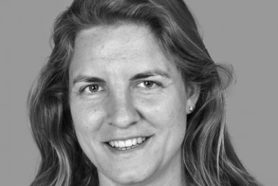2019 – Watch the full lecture

Dr. Friederike Bungenstock, Head of research of the Department of Coastal and Quaternary Geology at the Lower Saxony Institute for Historical Coastal Research
Wadden Sea archives of changes in past sea-level and landscapes
Sea level data for the tidal basin of the East Frisian Island Langeoog have been collected and evaluated by profile sections and seismic tracks in order to create a Holocene sea level curve representative for this area. Combined with an existing model of the base of Holocene deposits (NIBIS map server, official portal to the Geodata of the Lower Saxony Soil Information System NIBIS), assumptions of paleo tidal ranges and the lithostratigraphical data of more than 5000 cores, archived at the LBEG (Geological Survey of Lower Saxony), palaeogeographical maps from 9000 BP onwards could be reconstructed. Although there is a lack of absolute chronology, these maps deliver a general picture of the depositional history and change of lithological units over time.
Due to the lack of datings and further landscape information mainly on vegetation history and ecological parameters these maps initiated the WASA (Wadden Sea Archive) project. The interdisciplinary research project integrates sedimentology, hydroacoustics, geochemistry, palaeoecology and archaeology in a multiproxy approach involving exploration, analysis and predictive modelling. The focus of the project is to identify and investigate coastal archives in order to reconstruct the development of the Quaternary palaeo-landscapes and to model the environmental conditions for site location preferences of former human societies.

Dr. Aimée Slangen, NIOZ Royal Netherlands Institute for Sea Research, Department of Estuarine & Delta Systems, and Utrecht University.
Past, present and future sea-level rise in the Netherlands
In this presentation, we will discuss the different processes that contribute to sea-level change and come to understand why global and regional sea-level change are different. We will look at observed and modelled sea-level change along the Dutch coast for the 20th and 21st century, and discuss the main uncertainties in sea-level projections for the coming centuries. Finally, we will look at examples of coastal impacts of sea-level change, such as changing sea-level extremes and geomorphology.

Dr. Marjolijn Haasnoot, water resources management and environmental modelling at Deltares and Utrecht University
Adaptation pathways to uncertain sea-level rise.
In this presentation, we will present adaptation pathways to uncertain sea level rise for different coastal archetypes. For the Dutch delta, we show different pathways to maintain the coast, reduce flood risk and supply fresh water. Finally, we will discuss how potential high-end and accelerated sea-level rise could be a game-changer for coastal adaptation.

